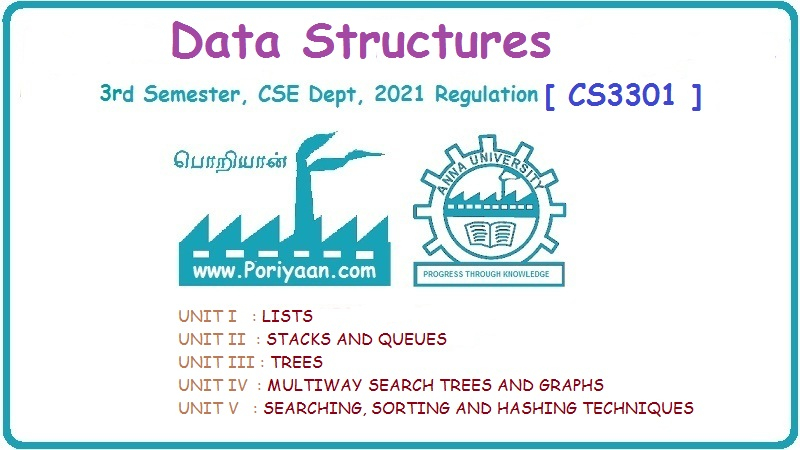Data Structure: Unit V (a): Searching and Sorting
Two marks Questions with Answers
Searching and Sorting | Data Structure
Sorting is useful for arranging the data in desired order. After sorting the required element can be located easily.
Two Marks Questions with Answers
Q.1What is the importance of sorting and
searching techniques ?
Ans; Sorting is useful for
arranging the data in desired order. After sorting the required element can be
located easily.
Searching
technique is essential for locating the position of the required element from
the heap of data,
Q.2 Give any two applications of sorting.
Ans. :
1. The
sorting is useful in database applications for arranging the data in desired
order.
2. In
the dictionary like applications the data is arranged in sorted order. 39156 2
3. For
searching the element from the list of elements, the sorting is required.
Q.3 What do you understand by the term sorting
?
Ans. Sorting is a mechanism of
arranging the data in particular order.
Q.4 What is the need for sorting?
Ans. The sorting is useful for
-
1. Searching
the desired data efficiently. 2. Responding to the queries.
Q.5 What is the meaning of sort key?
Ans; Sort key is a field in the
record based on which the sorting is conducted.
Q.6 Name the slowest and fastest sorting
technique.
Ans. Bubble sort is a slowest
sorting technique and quick sort is the fastest sorting technique.
Q.7.Differentiate between internal and external
sorting.
Internal
sorting: This is a type of sorting technique in which data resides on main
memory of computer.
External
sorting: This is a sorting technique in which there is huge amount of data and
it resides on secondary storage devices while sorting.
Q.8 Explain the meaning of the term passes in
context with sorting.
Ans. : While sorting the
elements in some specific order, there is lot of arrangement of elements.. The
phases in which the elements are moving to acquire their proper position is
called passes.
Q.9 What is ascending and descending order?
Ans. : Searching and Sorting
Ascending order is the sorting order in which the elements are arranged from
low value to high value. In other words it is called increasing order. For
example: 10, 20, 30, 40.
Descending
order is the sorting order in which the elements are arranged from high value
to low value. In other words it is called decreasing order. For example: 40,
30, 20, 10.
Q.10 What is the basic principle behind the
quick sort ?
Ans. : The division of the list
into two sublists(which is called partition) and then sorting each sublist
independently. This is the basic principle used in quick sort. Based on the
value of pivot element, the list is subdivided.
Q.11Enlist four internal sorting techniques.
Ans. : Following are some
internal sorting techniques
1.
Insertion sort 3. Shell sort
2.
Selection sort 4. Bubble sort
Q.12 What do you mean by heap?
Ans. Heap is a complete binary
tree or almost complete binary tree in which every parent node be either
greater or lesser than the parent node.
Q.13 What are the two stages in which heap sort
is conducted?
Ans. Following are the two stages
in which the heap sort is conducted Heap construction: The heap structure is
build for given list of elements
Deletion
of maximum key: In this phase the root key is deleted for n - 1 times.
Q.14 The way a card game player arranges his
cards as he picks them one by one is an example of
Ans. :insertion sort
Q`15 A
sort which iteratively passes through a list to exchange the first element with
any element less than it and then repeats with a new first element is called
Ans. : selection sort
Q.16 Explain why binary search can not be
performed using linked list ?
Ans. : In binary search
algorithm, the mid element needs to be searched. If binary search is
implemented using arrays then by simply saying a[mid] we can access the middle
element of an array in constant time. But for finding the mid element of a
linked list we have to execute separate algorithm and it can not be done in
constant time. Thus implementing binary search using linked list is very
inefficient way. Hence it is not preferred to implement a binary search using
linked list.
Q.17What do you understand by the term
searching ?
Ans; Searching means locating the
position of the desired record or key element from the given database.
Q.18 What are the advantages of binary search
over the linear search?
Ans. : Binary search is an
efficient searching method than the linear search. Using this method, the list
is subdivided each time and only sublist is scanned for locating the key value.
Q.19 What is the time complexity of binary
search?
Ans. : The time complexity of
binary search is O(logn).
Q.20 List the sorting algorithms which uses
logarithmic time complexity
Ans. : The sorting algorithms
which use the logarithmic time complexity are Quick sort and merge sort.
Q.21
Compare linear search and binary search.
Ans. :

Q.22 What is the time complexity of insertion
sort ?
The time complexity of insertion sort is O(n2)
Q.23 State the complexity of binary search.
Ans. : The best case time
complexity is O(1). The worst case and average case time complexity O (log n).
Q.24 Compare linear search and Binary search.
Ans. :

Q.25 Define radix sort.
Ans. : Radix sort is a sorting
technique in which the number is sorted based on its individual digit
Data Structure: Unit V (a): Searching and Sorting : Tag: : Searching and Sorting | Data Structure - Two marks Questions with Answers
Related Topics
Related Subjects
Data Structure
CS3301 3rd Semester CSE Dept | 2021 Regulation | 3rd Semester CSE Dept 2021 Regulation
